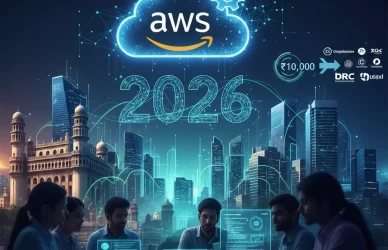As the tech industry continues to adopt cloud-native and automated infrastructure, roles like Cloud Engineer and DevOps Engineer are becoming more important—and more in-demand. However, many job seekers confuse these two roles or believe they are interchangeable.
In reality, while there is some overlap in tools and skills, the day-to-day responsibilities, priorities, and long-term goals of Cloud and DevOps Engineers differ significantly. This guide compares the two roles in depth to help you understand which career path might suit you best.
Role Overview: Cloud Engineer vs. DevOps Engineer
- Cloud Engineer: Designs, deploys, and manages cloud infrastructure (AWS, Azure, GCP). Focuses on security, cost-efficiency, and scalability.
- DevOps Engineer: Builds and automates software delivery pipelines. Ensures fast, reliable, and secure code deployment.
Key Difference:
Cloud Engineers are infrastructure architects. DevOps Engineers are automation specialists focused on delivery processes.
Core Responsibilities
Cloud Engineer
- Architect and deploy cloud infrastructure
- Manage storage, compute, and networking
- Monitor system health and cost performance
- Implement cloud security and compliance best practices
- Evaluate and integrate new cloud services
DevOps Engineer
- Build and maintain CI/CD pipelines
- Automate builds, tests, and deployments
- Monitor system logs and alerts
- Manage container platforms (e.g., Kubernetes)
- Respond to incidents and optimize delivery reliability
Daily Workflow Comparison
Morning Tasks
Cloud Engineer
- Log into cloud dashboards (AWS, Azure, GCP)
- Review alerts and usage metrics
- Monitor scaling events or anomalies
DevOps Engineer
- Review build/deployment logs
- Troubleshoot pipeline failures
- Coordinate with devs on blocked releases
Midday Tasks
Cloud Engineer
- Configure VPCs and security groups
- Update IAM roles and firewall rules
- Plan architecture changes with solution architects
DevOps Engineer
- Write scripts for automation
- Refactor Jenkins or GitHub Actions workflows
- Update Helm charts and Kubernetes resources
Afternoon Tasks
Cloud Engineer
- Analyze cost reports and optimize usage
- Join security audits or compliance reviews
- Attend sprint planning with cross-functional teams
DevOps Engineer
- Handle incidents and root cause analysis
- Adjust alerting thresholds
- Add security scanning tools to CI/CD
Key Tools by Role
Cloud Engineer
- Cloud Platforms: AWS, Azure, Google Cloud
- IaC: Terraform, Pulumi, CloudFormation
- Monitoring: CloudWatch, Azure Monitor, Stackdriver
- Scripting: Bash, Python, PowerShell
DevOps Engineer
- CI/CD: Jenkins, GitHub Actions, GitLab CI/CD
- Containers: Docker, Kubernetes, Helm
- Config Management: Ansible, Puppet, Chef
- Monitoring: Prometheus, Grafana, Datadog
- Logging: ELK Stack, Fluentd, Loki
Team Collaboration
Cloud Engineers typically work with:
- Solution architects
- Security/compliance teams
- Finance and procurement
DevOps Engineers often collaborate with:
- Developers and testers
- QA and product teams
- Site Reliability Engineers (SREs)
Cross-functional communication is essential for both roles.
Career Path Comparison
| Feature | Cloud Engineer | DevOps Engineer |
|---|---|---|
| Entry Path | Sysadmin, Network Engineer | Developer, IT Operations |
| Key Certifications | AWS/Azure/GCP, Terraform | CKA, GitLab CI/CD, Jenkins Engineer |
| 2025 Avg. Salary | $110K–$160K | $115K–$170K |
| Long-Term Growth | Cloud Architect, FinOps Specialist | SRE, Platform Engineer |
Which Role is Right for You?
Choose Cloud Engineering if you:
- Enjoy working with infrastructure, networking, and security
- Want to focus on scalability and cost optimization
- Prefer long-term infrastructure design and planning
Choose DevOps Engineering if you:
- Enjoy scripting and tool development
- Like improving automation and deployment speed
- Prefer building systems that support developer workflows
Key Questions to Ask Yourself:
- Am I more excited by infrastructure or delivery pipelines?
- Do I prefer cloud architecture or developer operations?
- Do I enjoy system design or workflow optimization?
Conclusion
Cloud Engineers and DevOps Engineers are both critical to modern software teams—but their focuses are different.
Cloud Engineers manage the infrastructure layer, ensuring systems are robust, secure, and scalable. DevOps Engineers streamline how software moves from code to production, optimizing speed and reliability.
Both offer lucrative salaries and strong growth opportunities, with some professionals transitioning between the two as their careers evolve.
FAQs
1. Can a cloud engineer become a DevOps engineer?
Yes. With scripting and pipeline experience, cloud engineers can shift into DevOps roles.
2. What’s the average salary for each role in 2025?
- Cloud Engineer: $110K–$160K
- DevOps Engineer: $115K–$170K
3. Do both roles require coding?
Yes, primarily for scripting tasks (Python, Bash, PowerShell, or Go).
4. Is there more demand for Cloud or DevOps engineers?
Demand is strong for both, but DevOps may have slightly broader applicability across industries.
5. What certifications help in each path?
- Cloud: AWS/Azure/GCP Associate, Terraform
- DevOps: CKA, Jenkins Engineer, GitLab CI/CD







